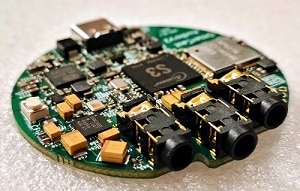Small in size yet powerful, the device offers to plays quality audio in a multiroom environment for enhanced listening experience
 Everyone loves audio streaming that offers wide compatibility and easy-to-use features that is cost-effective. The listening experience becomes even more extraordinary when you can reliably play your favourite music over the air whenever you need it
Everyone loves audio streaming that offers wide compatibility and easy-to-use features that is cost-effective. The listening experience becomes even more extraordinary when you can reliably play your favourite music over the air whenever you need it
To accomplish that, here’s presenting the OtterCastAudioV2, an open-source audio streaming device running Linux. Based on a Sochip S3 SoC, it supports AirPlay web interface, Shairport Sync, Snapcast, Spotify Connect and PulseAudio sink/source. Now one can experience synchronised multiroom audio with the power of Ethernet.
The Otter Cast Audio is circular (50mm diameter; Google Chromecast Audio is 52mm with case), making it small enough to easily fit in your palms. The firmware is built using Buildroot, a simple, efficient and easy-to-use tool to generate embedded Linux systems through cross-compilation.
Technical specifications include:
- CPU: S3 128MB DDR3 1.2GHz single-core Cortex-A7
- Connectivity: SDIO Wifi + BLE, 100BASE-T, USB-OTG
- Boot from Micro-SD, UART boot console via pinheader
- Line-In port can be used to stream audio from devices like record players, tape recorders to many devices in the same network.
- Runs a mainline Linux kernel, with GNU userland, systemd, PulseAudio and Avahi.
OttercastAudio also features an integrated headphone amplifier (30mW into 32Ω, 60mW into 16Ω).
Another member of the OtterCast family is the OtterCastAmp, an open-source USB-C PD powered, 4x 30W amplifier, based on a Sochip S3 SoC. With an integrated streaming, large display, Ethernet and WiFi, it can drive speakers and a subwoofer directly without external crossovers.
As of now, the team is planning a small batch production run that will be launched in future. But if you don’t want to wait, you can simply run a small batch on your own (see here on how to do it).
The project is open-source and all technicalities can be found in its GitHub repositories.







